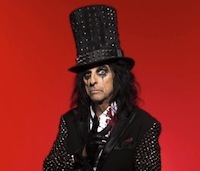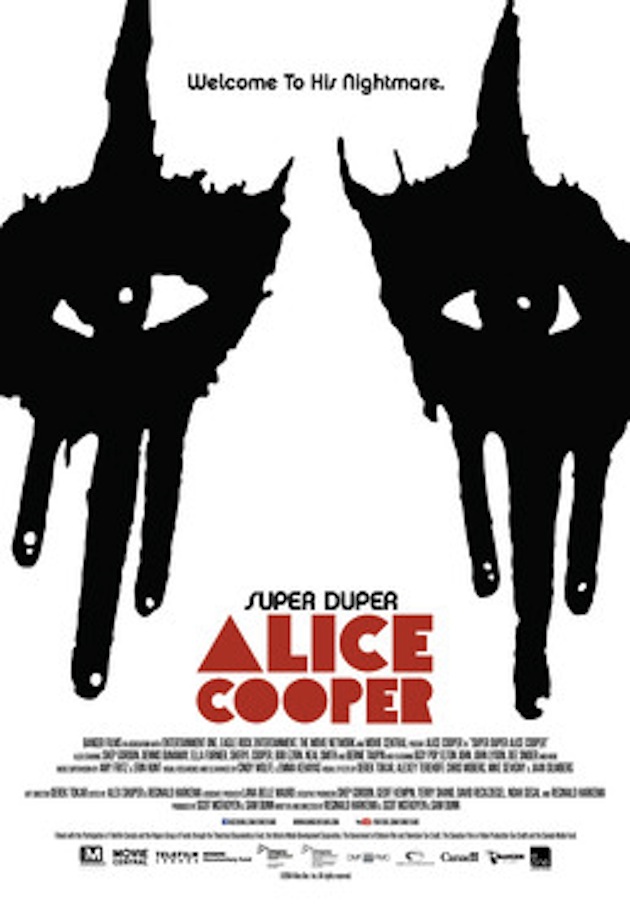 Kory Grow of Rolling Stone spoke with Alice Cooper about his documentary, Super Duper Alice Cooper, which premieres at the TriBeca Film Festival today (April 17th). Excerpts from interview appear below.
Kory Grow of Rolling Stone spoke with Alice Cooper about his documentary, Super Duper Alice Cooper, which premieres at the TriBeca Film Festival today (April 17th). Excerpts from interview appear below.
Rolling Stone: How did it feel to see your life flash before your eyes?
Alice Cooper: It’s funny, because I don’t live in the past. I understand how people want to know how it all worked, how it all started and everything, and it was an interesting story. But it was fun for me to go back. And I don’t apologize for anything – it all happened in the “Golden Age,” when you could make references to Jimi Hendrix and Jim Morrison and realize, “I used to get drunk with those guys.” That makes it infinitely more interesting because you were there for the “Lost Weekend.” In fact, I think was the bartender that week. [Laughs]
Rolling Stone: As you recounted stories about people like Hendrix and Morrison, what struck you?
Alice Cooper: What I learned from them – except for John Lennon, of course, which was a really different thing – was that they all just burned out. Jim Morrison, Jimi Hendrix, Janis Joplin, Keith Moon: They all were of that mindset of, “Get it done now, because I don’t want to be doing this when I’m 30.” And my mindset at that time was, “I’ve got to figure out how to separate myself from this character, or it’s going to kill me.” [Laughs] For me, it was figuring out how to eliminate the gray area so that I could have a life, and “Alice” can have his own life, without apology.
Rolling Stone: [Regarding your live show], did you ever devise any practical effects that were too dangerous to pull off?
Alice Cooper: Not too dangerous, but there were a lot of “Spinal Tap moments.” When I saw Spinal Tap, I went, “Oh, boy.” I got stuck in the pod a couple of times. But there were things like, “Well, let’s shoot Alice out of a cannon,” and we bought the cannon and it worked great. I’d get in the cannon, I’d get out the back, and they’d shoot the dummy across into the thing and I’d already be on the other side and walk out. It’s an illusion, but it looked great. And of course, I got it on stage and the cannon goes “BANG!” and the dummy comes out about about six inches. You have to play it like, “O…kay.”
But nothing has been too dangerous. The guillotine is a 40-pound blade; it misses me by six inches every night, for the last 40 years. Same thing with the hanging: It’s a piece of piano wire keeping you from hanging, and you got to hope that piano wire has been checked that night. When you get a 12-foot python on the stage, 99 percent of the time, he’s gonna be OK — but what if there’s that one night when he decides, “This is the night I’m gonna just do it?” I’ve always liked the idea that there’s an element of possibility of something really happening.
Rolling Stone: The [movie] includes the Toronto concert where fans threw a chicken onstage, you threw it back and the audience tore it to shreds. At that show, you were opening for John Lennon. Did he ever say what he thought of that?
Alice Cooper: Oh, he loved it. John Lennon was a Hollywood vampire. He was one of our drinking guys. But it was John Lennon and Yoko when they were doing their art. So they saw it as that; Yoko and John were like, “Yeah, this is great.” John thought that was funny. And I didn’t kill the chicken. [Laughs] Even if they would have wanted me to, I wouldn’t have killed the chicken. But I realized at that point how bloodthirsty people at the peace-and-love festival — that’s what it was — were. They had no problem killing the chicken.
Rolling Stone: In the doc, Bernie Taupin expresses remorse for turning you on to cocaine right after you had cleaned up. Did he ever apologize to you personally?
Alice Cooper: No, Bernie was my best friend. And cocaine was, like, breathing in Los Angeles at the time. I didn’t know anybody that didn’t do coke. I was maybe the only one that didn’t. Having an addictive personality, it was the worst thing I could’ve tried. At least I had the experience of kicking alcohol, which was the hardest thing for me. So kicking cocaine was not hard. That was just a matter of, “OK, enough of that.” The alcohol was really the drug for me that was a tough one, because it was so available, it was legal.
Read more at Rolling Stone.
source: rollingstone.com


17 Responses
Luke! If you want to learn more about the early Alice Cooper music, then you must start with Love It to Death, the third album. The first two albums were pretty much the band’s “apprenticeship”, but something magical happened between the second and third. They learned to REALLY play their instruments, and they figured out how to write great songs. I’m Eighteen is the big hit off of it, but pretty much every track is good. My favorites are Caught in a Dream, Long Way to Go, the nightmarish Black Ju Ju, and Is It My Body. Wow! Great stuff. I love the photo on the back with their Gibson SGs. I wanted to grow up to be just like that! LOL. Later albums to check out are School’s Out, Killer, and Billion Dollar Babies. The final album from the original lineup was Muscle of Love, and you could tell the booze and frayed nerves were beginning to take its toll. I wish the original group could find a way of re-uniting for some new tunes (minus the much-missed Glen Buxton of course) but I don’t know if there is bad blood between any of them. You’d have to ask them.
To answer Luke’s question, the top three songs (early stuff, at least) are, in chronological order:
1) I’m Eighteen
2) School’s Out
3) No More Mr. Nice Guy